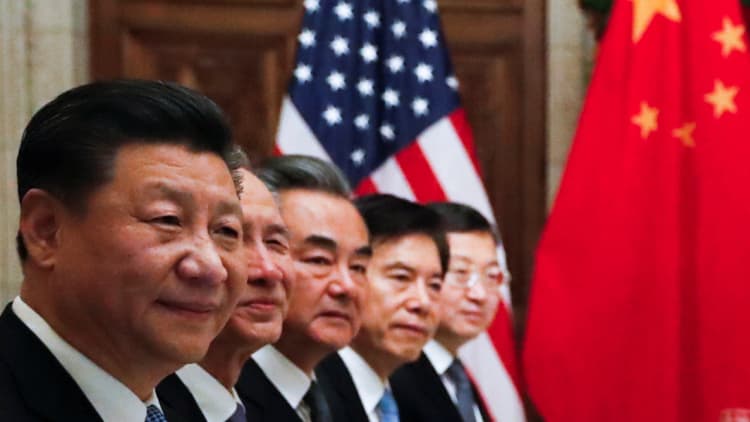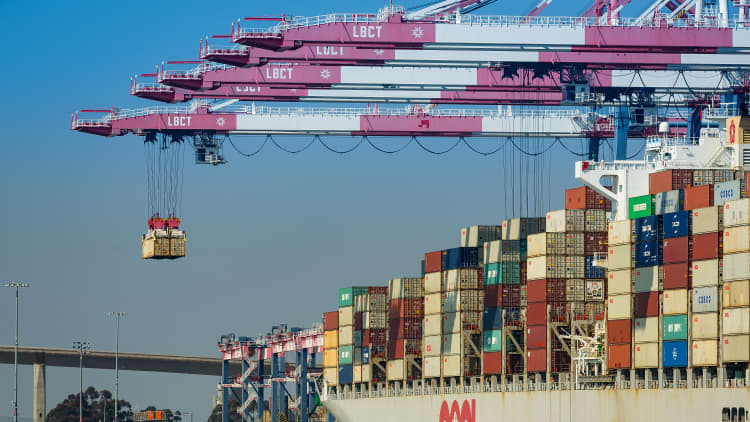U.S. President Donald Trump and Chinese President Xi Jinping's tariff ceasefire agreement over the weekend in Argentina was "a mistake" that undermines the global trading system, an expert told CNBC on Tuesday.
The two world leaders agreed to put any escalations to their trade war on pause at the G-20 summit in Buenos Aires. The U.S. will leave tariffs on more than $200 billion worth of Chinese products at 10 percent, but will wait 90 days before raising those to a previously threatened 25 percent level as the two countries continue negotiations, according to the White House.
Markets initially cheered the ceasefire, but that optimism was short-lived. Several inconsistencies — in statements by Beijing and Washington, and within the White House — suggested that both sides would not be able to find a common ground within the 90-day period and reignited worries that the tariff fight could slow down the global economy.
For Adam Triggs, director of research for the Asian Bureau of Economic Research at Australian National University, there are more reasons to dislike the deal than just it's tight time frame.
"The deal is a mistake because it undermines the global trading system, will divert trade from other countries and will not reduce the U.S. trade deficit anyway," he told CNBC in a Tuesday email. "It's also a mistake because there are genuine problems in the trading system which the G-20 should be addressing."
That is, according to Triggs, a multinational group such as the G-20 should have been deployed to create a multilateral agreement on issues such as the need to remove barriers to trade in services.
"Trump's constant focus on bilateral deals distracts the G-20 from these real issues," he added. "These are issues that can only be solved multilaterally, not bilaterally."
According to a statement from the White House, "China has agreed to start purchasing agricultural product from our farmers immediately." For Triggs, that was evidence that Trump's bilateral deal will hit other nations: "China is currently buying agricultural products etc. from other countries ... If China is forced to buy more from the U.S. then history shows it will reduce how much it buys from these other countries."
A multilateral approach
If Trump wanted Xi to address China's unfair trading practices he should have worked closely with other American allies to confront Beijing as a coalition, according to Triggs, who is also a visiting researcher at the Brookings Institution.
Washington "should have showed leadership, brought (allies) together and approached China and others as a coalition. This would have been more effective and would have addressed the genuine challenges in the trading system instead of distracting the global community with a lose-lose trade war that harms U.S. and Chinese citizens," he added.
Trump, Triggs said, should have worked with partner nations at the G-20 to a "set of reforms to the WTO to modernize the institution, expand trade in services and remove behind-the-border barriers to cross-border commerce," he said.

One of the other criticisms from experts about the weekend's agreement was that concrete concessions appeared to be missing.
"China did not make any substantial compromise on paper but rather just agreed to work towards reforms," said Stephen Nagy, senior associate professor at the International Christian University in Tokyo and distinguished fellow at the Asia Pacific Foundation, Canada.
The U.S. and China did not release a joint statement following Saturday's meeting, leaving observers to interpret for themselves what the talks accomplished based on two very different readouts.
Trump, Xi motivations
Trump and Xi were motivated to come to this agreement to offset certain domestic pressures they have been facing as the trade war had been heating up, Nagy told CNBC.
The Trump administration's motivations were more "tactical" with the president trying to gain "political capital as oppositional forces have increased over the past few months," he said. As Trump faces domestic pressures over the federal investigation into his campaign and associates he needed "a political win" back home, Nagy added.
In comparison, China has more long-term goals as it tries to recalibrate its strategies to better handle American pressure in the future, he said.
For Nagy, the deal did not mean a more meaningful agreement was on the horizon: "After the 90 day truce, trade tensions will continue and likely even deepen," he said.
WATCH: How do tariffs work?

—CNBC's Christina Wilkie, Kevin Breuninger and Javier David contributed to this report.

